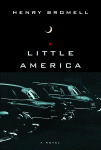AAK: Is this your first novel? Have you done other types of writing?
HB: I have written a previous novel, The Follower, as well as two collections of stories: The Slightest Distance, which won a Houghton Mifflin Literary Fellowship Award, and I Know Your Heart, Marco Polo. My work has appeared in The New Yorker, Rolling Stone, and The Atlantic, and my stories have twice won O. Henry Awards. I have also written and produced four television dramas—Northern Exposure, I’ll Fly Away, Homicide: Life on the Street, and Chicago Hope—for which I have received a Writer’s Guild Award, a Humanitas Award, and two Peabody Awards. My first movie, Panic, which I wrote and directed, stars William H. Macy, Neve Campbell, and Donald Sutherland, and was an official selection at the 2000 Deauville Film Festival.
AAK: How long have you been at work on this novel and what are your writing habits?
HB: I first started thinking about this novel more than fifteen years ago, so let’s say there has been a very long gestation period. During those fifteen years, I essentially wrote the book several times in my head, never finding a form or voice that satisfied me. Over time, I came to understand who my main characters were, what the world was, what the themes were, but I still couldn’t figure out how to put it all together, it was too complicated for me, I lacked the technique. Then one day I sort of felt it, the whole of it, the voice came to me, and with it, the form, but in an inarticulate way; as I say, I felt it. I realized it was time to take a leap, itself an act of faith. So I simply locked myself in my office and didn’t come out for six months, and when I did come out, I had Little America with me.
AAK: How, if at all, did you research the novel?
HB: During those fifteen years of gestation, I studied Cold War politics, both at home and abroad, as well as the history of the CIA, Middle East politics circa 1914-1960, and, of course, the illustrious Hashimite family, for whom I have fabricated an imaginary branch. I also interviewed a number of the men and women still living who worked for the CIA during the 1950’s, including my father. Which brings me to another kind of research, the investigation of memory. I grew up in the world I am writing about, son of a CIA officer stationed throughout the Middle East in the 1950’s, and so I relied on my memory, sense-memory, that is, a child’s experiences—overwhelming, deeply tactile, wondrous and frightening—to guide my creation of time and place.
AAK: Was it difficult plot out such an intricate story line?
HB: Once I got going, once I left the fifteen year meditation and actually started writing, the plot unfurled before me every day, delighting and surprising me. The only thing I knew, plot-wise, before I started, was the ending, and even that became, in the writing, much more intricate and devious.
AAK: The manner in which the country of Kurash was described was very realistic. Was it fashioned from an actual Middle Eastern country or a composite of many?
HB: Kurash is based, physically, on my memories of Lebanon, Syria, Iraq, Jordan, and all the deserts and mountains in between. But remember, much of Kurash is invented—it is, after all, and imaginary country—and so some oddities appear. Trolley cars, for example.
AAK: Are there any characters with whom you have a particular affinity?
HB: I feel especially close to Kumait, the King, and Mack. Their stories, taken together, seem to form the three sides of the essential tragedy (triangle) of the novel.
AAK: How do you think Terry’s occupation as a historian functions throughout the novel?
HB: Among other things, Little America, is about history, or rather, the way history is put together—who’s story gets told, what point-of-view prevails, what gets left out. I just thought it would be interesting to have a narrator who was trying to track down a personal, or private matter, using the same methods one would use to track down a public, or historical, matter. Can the truth—private or public—ever really be reached? Or is the quest a series of endless discoveries? At the same time, someone has to try. Someone has to speak for the silenced. And then, of course, I liked the fact that an historian is not unlike a detective, or a spy.
AAK: Relationships are very important throughout the novel. For instance, Mack and the King, Mack and his wife, and the United States and Karesh. How do you think each one functions to propel the novel forward?
HB: I guess I feel that relationships are among the most vivid expressions of who we are as people and as citizens. If we can’t be truthful in our relationships, then that gives the lie to everything else in our lives. The relationships in Little America are made up of friendships and affections all too often founded on betrayal, or exploitation and manipulation, or simply, secrecy. The exception to this might be Mack and Jean, because their relationship is founded on shared secrecy, and a shared deception, an exclusivity that is sometimes romantic, even downright erotic. But the truth is they’re playing a game, The Game, charades, at everyone else’s expense. It’s fun, and exciting, and glamorous, and very, very cruel.

